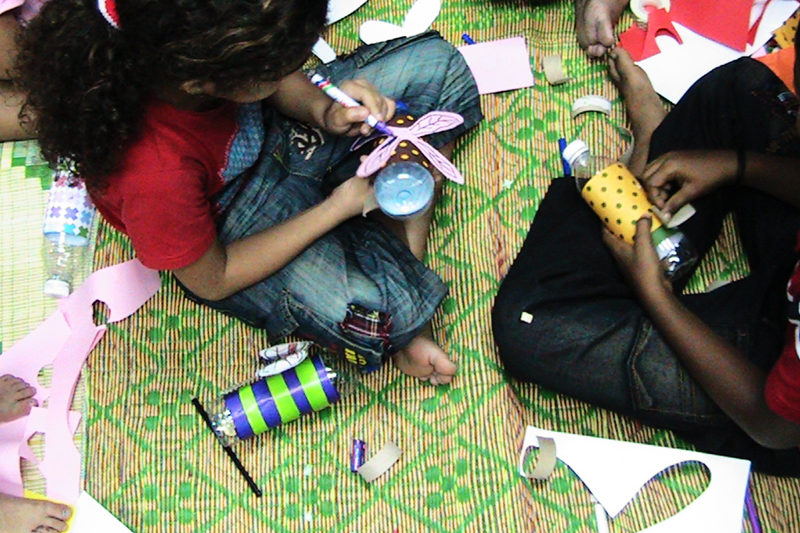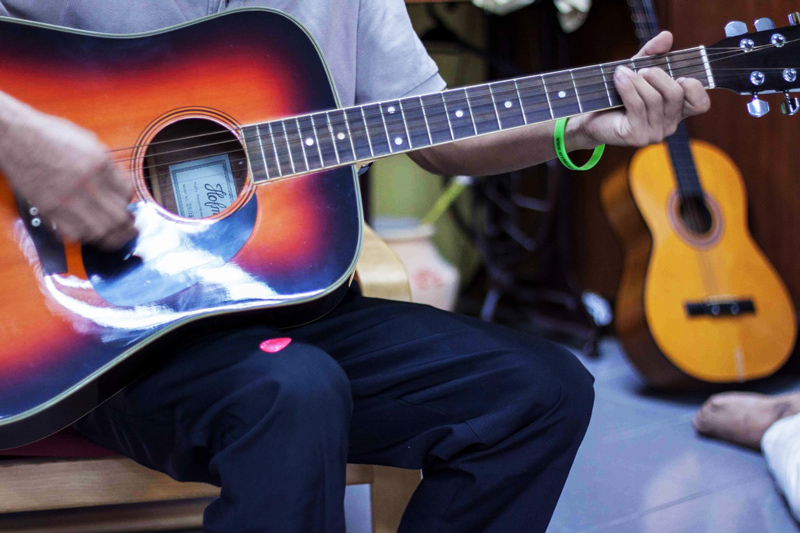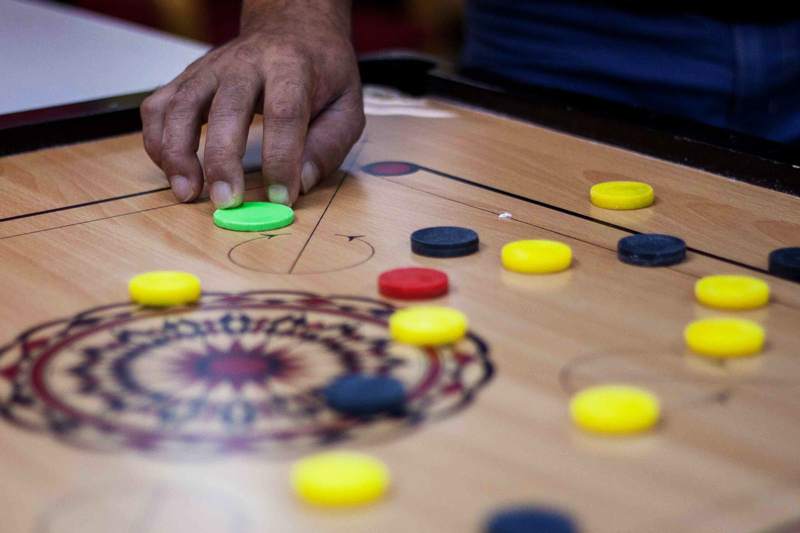Established in 2007, Health Equity Initiatives (HEI) is a Malaysian not for profit health organization based in Kuala Lumpur.
The organization is committed to advancing the right to health of marginalized populations through its integrated and comprehensive core programs.
HEI’s team of health professionals carries out community based health interventions, professional mental health services, research and monitoring activities, and evidence based advocacy. HEI also has an internship and elective program for students of medicine.
HEI primarily works with refugees and asylum seekers in Malaysia, and the organization believes community decision-making and participation are critical to empowering marginalized communities.
Mission and Vision
Mission
Health Equity Initiatives (HEI) has a mission to promote and protect the right to health of marginalized communities.
HEI believes that universal access to affordable, high quality health care is a fundamental human right and recognize that community participation and empowerment are instrumental to the realization of these rights.
Vision
A socially just world in which every human being is entitled to enjoy the highest attainable standard of health conducive to living a life in dignity.
Long-Term Objectives
- To establish and reorient laws, policies and programs to recognize and advance the right to health of marginalized communities so they are better able to achieve equity and justice in health.
- To improve the physical and mental health of marginalized communities thus enabling them to live with increased dignity and well-being.
- To strengthen marginalized communities to enable them to become more effective in promoting their right to health through interventions, advocacy and policy making at the community, national and international levels thus enabling them to gain increased agency over their health and lives.
Core Values
Health Equity Initiatives’ (HEI) core values define its organizational culture, and each member of the HEI team works and operates in accordance with these values.
These values guide all interactions, communication and decision-making both within and outside HEI, including relationships with staff, patients, partners, communities, organizations, funders, government, or other parties. They also help HEI to manage and prioritize time, energy and resources; design and implement programs and systems; and choose which project and funding opportunities to pursue.
Human Rights and Democracy
To uphold and advocate for the human rights of all and the principles of democracy upon which a just society rests.
Integrity and Honesty
To ensure a foundation of integrity and honesty guides all endeavors.
Transparency and Accountability
To operate transparently and be accountable for all actions, outputs and decisions.
Equality and Non-discrimination
To advance and operate according to the principle that every individual is entitled to full and equal access to all civil, political, economic, social, and cultural rights, and the understanding that no person shall be discriminated against based on race, nationality or ethnic origin, religion, political or other opinion, gender, class/caste, age, language, disability, sexual orientation, or other status.
Mutual Respect
All relationships shall be guided by a dynamic of mutual respect, which recognizes the opinions, beliefs, values, experiences, and status of others, and includes sensitivity to differences in power.
Participation and Team Work
To work within a participatory framework that values the community as an equal partner and be guided by a spirit of team work to accomplish all tasks.
Gender Equality
To advocate for women’s equal access to and participation in all aspects of society, including economic, political, legal, education, and health systems, as well as women’s freedom from all forms of discrimination, violence, abuse, and exploitation.
Empathy and Compassion
To be guided by a genuine concern for and sensitivity to the difficulties of others, which encompasses the motivation to alleviate the circumstances that give rise to such challenges.
The Team
Health Equity Initiatives’ (HEI) management structure is comprised of a Board of Directors and a Steering Committee who volunteer their time and expertise to oversee the running of the organization.
They are made up of prominent persons in their areas of profession. The Steering Committee has advisory and oversight functions in relation to the organization. The Board has additional fiduciary duties, and works closely with the Executive Director and Program Director in providing day-to-day operational guidance.
Both the Board and Steering Committee members sit on separate working groups that guide the Implementing Team on organizational management, program and content related matters.
Board of Directors
Dr. Sharuna Verghis PhD is the co-founder and Director of HEI. She is a public health researcher, educator, practitioner, and advocate. Dr. Verghis has worked extensively on the issue of migration and health for more than 20 years, at community and regional/international levels. She was the first Coordinator of Coordination of Action Research on AIDS and Mobility (CARAM Asia) and set up its regional secretariat in Kuala Lumpur. Dr. Verghis has served on national, regional, and international research and intervention projects related to migration and health. Her doctoral thesis used an interdisciplinary approach uniting international human rights law with public health to examine the access of urban refugee women to maternal health care. She is a Senior Lecturer at the Jeffrey Cheah School of Medicine and Health Sciences, Monash University, Malaysia.
Dr. Xavier Vincent Pereira is a Consultant Psychiatrist and Psychotherapist, and a Professor at Taylor’s University’s School of Medicine. He consults at two private hospitals and the Sg. Buloh General Hospital. He has more than 20 years of experience in various forms of community work. He is also the founder Chair of the Catholic Counselors and Therapists Malaysia. He serves as a Director, Mental Health Services Director and pro bono psychiatrist at HEI. Dr. Pereira is an alumni of St. John’s Medical College, Bangalore, India. He did his Masters in Psychological Medicine at University Malaya and has a certification in IPT by the International Society of IPT. He gained further certification as a supervisor and trainer in IPT under the IPT Institute, USA.
Steering Committee Members
Dr. Alice Nah PhD is a Research and Teaching Fellow at the Center for Applied Human Rights at the University of York. She is actively involved in transnational civil society networks – she is the Vice President of the International Detention Coalition and a member of the Steering Committee of the Asia Pacific Refugee Rights Network (serving as its previous Chair). In recognition of her achievements in migrant and refugee rights advocacy, the US State Department in its 2009 Trafficking in Persons (TIP) Report named her as one of its nine heroes. She conducts research on state power and non-citizens in Malaysia as well as security management practices of human rights defenders at risk around the world.
Ms. Asha Lim is a lawyer by training and has vast experience in working with disenfranchised communities. She has worked with interest groups focusing on people with disabilities, child abuse, trafficking, HIV and AIDS, refugees, and disaster response, in a number of countries including Malaysia, Thailand, India, Uzbekistan, and Cambodia. In the midst of diversity of interests, her focus has always been the delivery of services to and the empowerment of persons in great need, especially children. Her personal mission is to facilitate the delivery of these services to the standard of good governance, transparency and accountability. Ms. Lim serves as a Steering Committee Member of HEI.
Ms. Michelle Reining currently sits on the Steering Committee of Health Equity Initiatives and assists in providing support to HEI’s Research and Advocacy Program. Ms. Reining has six years of experience working in regional and national non-government organizations in Malaysia. Most of her work has been in the area of research, publications development, and project coordination and has focused on access to health care for marginalized communities, particularly migrant and refugee populations, as well as women’s sexual and reproductive health and rights. Ms. Reining pursued her academic training in Canada and has an undergraduate degree in Psychology and a Master of Arts degree in Anthropology. She is currently pursuing a Masters in Public Health from the London School of Hygiene and Tropical Medicine.
Mr. Martin Jones is a lecturer in international human rights law at the Center for Applied Human Rights at the University of York. Mr. Jones has been a member of the executive committee of the International Association for the Study of Forced Migration and chaired its 11th biennial conference in Cairo. Mr. Jones is a member of the steering committee of the Southern Refugee Legal Aid Network and a consultant to refugee legal aid organizations in Cyprus, Egypt, Hong Kong, Jordan, Malaysia and Turkey; he has provided advice on refugee policy to UNHCR and the governments of Canada, Hong Kong, Indonesia, and Taiwan. In 2008, he co-founded the Egyptian Foundation for Refugee Rights which is now the largest provider of legal aid to refugees and migrants in domestic courts in Egypt. He was the first chair of the Legal Aid Working Group of the Asia Pacific Refugee Rights Network, a regional coalition of over 100 NGOs, and is an advisor to its steering committee. His research interests include the reform of the governance of the international refugee protection regime, the interaction between international and national refugee law, and refugee law in Asia.
The Community Center
Health Equity Initiatives (HEI) opened its Community Center in July 2008.
The Community Center is a space that has been created for use by the refugee community and NGOs who work with these communities. HEI’s mental health services are also located here.
Since it opened, the center has been used for a variety of meetings, training sessions, workshops, and community initiatives. The center is also equipped with a mini-library and a play area for patients and training participants’ children.
There is an area where visitors from the community are able to obtain day-to-day basic necessities on a needs basis. This area has been called the “Take What You Need Corner”.
Partners and Networks
Health Equity Initiatives (HEI) works in close collaboration with refugee community organizations based in the Klang Valley, Malaysia. The majority of HEI’s activities are carried out with refugee communities from Myanmar.
In addition, HEI has worked closely with the refugee community from Afghanistan residing in the Klang Valley. A spirit of partnership informs HEI’s work, as community members are involved from project design through to implementation, and are regularly asked to give feedback.
The refugee organisations from Myanmar that HEI collaborates with are:
- Alliance of Chin Refugees (ACR)
- Arakan Refugee Relief Committee (ARRC)
- Burmese Refugee Organization (BRO)
- Chin Catholic Refugee Community (CCRC)
- Chin Refugee Committee (CRC)
- Kachin Refugee Committee (KRC)
- Malaysia Karen Organization (MKO)
- Mon Refugee Organization (MRO)
- Multinational Women’s Organization of Burma (MNWOB)
- National League for Democracy (NLD)
- Organization for Karenni Development (OKD)
- Rohingya Society of Malaysia (RSM)
- Shan Refugee Organization (SRO)


